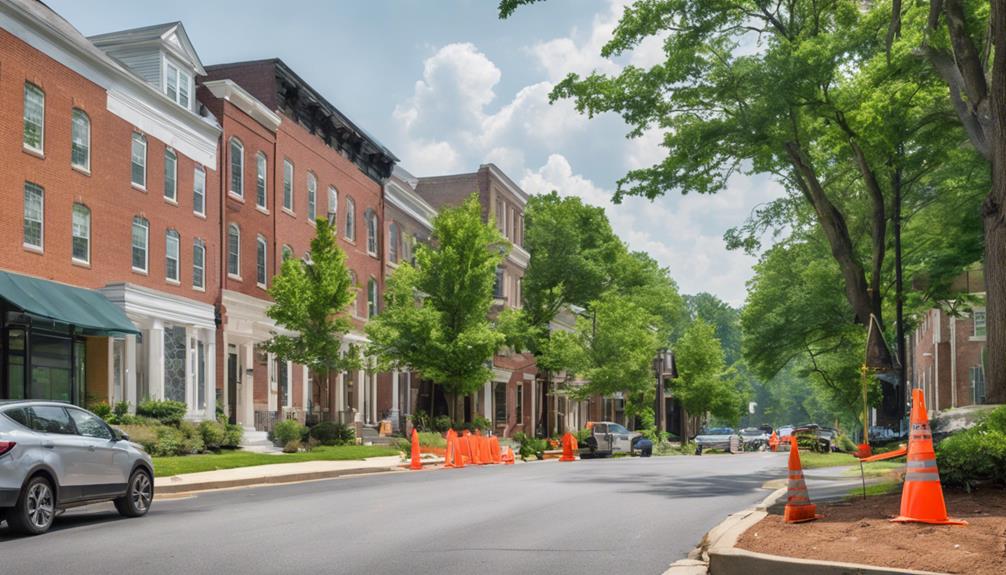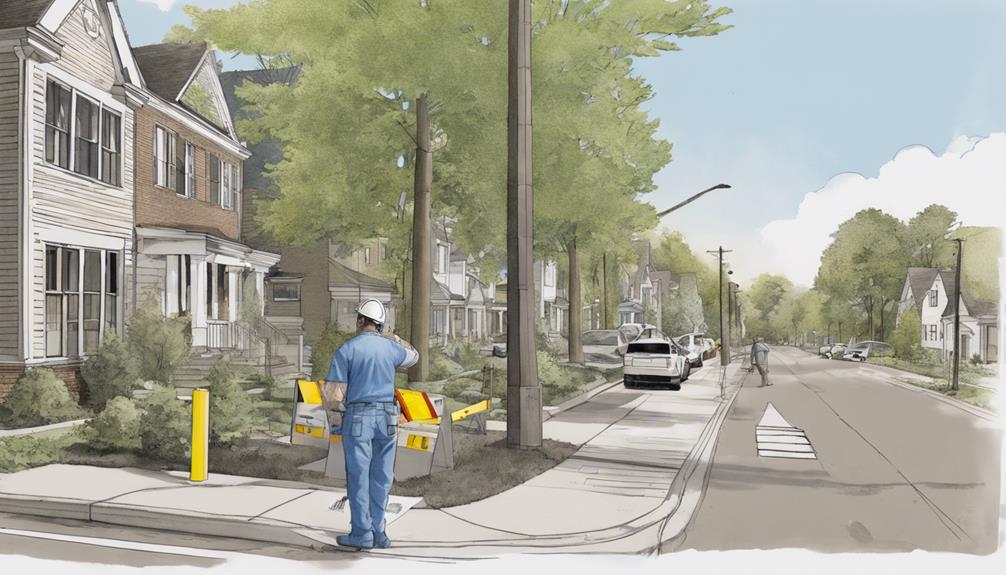If you're a contractor working in Falls Church, VA, understanding the Right-of-Way Contractor Bond is crucial for your projects. This bond not only ensures compliance with local regulations but also protects both your interests and those of the community. It can significantly impact your reputation and future opportunities. What's more, the application process and requirements can be a bit intricate, which raises questions about how to navigate them effectively. Let's explore what you need to know to ensure you're fully prepared for the challenges ahead.
What Is a Right-Of-Way Bond?

A right-of-way bond serves as a crucial financial assurance for contractors working on projects that affect public access or infrastructure. When you undertake such projects, this bond guarantees that you'll comply with local regulations and restore the area after your work.
Essentially, it's a safeguard for municipalities and the public, ensuring that you fulfill your obligations. Furthermore, the importance of state regulations can't be overstated as each state has unique requirements for these bonds. The bond acts as a form of insurance. If you fail to meet your commitments, the bond can cover the costs of completing the work or addressing any damages.
This means that you'll need to provide a financial guarantee, which helps build trust with local authorities and the community.
Obtaining a right-of-way bond typically involves an application process where you'll provide details about your project, financial history, and experience. Insurance companies or surety providers will assess your qualifications before issuing the bond.
In short, a right-of-way bond is a fundamental requirement for contractors like you, ensuring that your work on public infrastructure is responsibly managed and that you're held accountable for any impacts your project may have on the community.
Importance of the Bond
Understanding the importance of a right-of-way bond is essential for any contractor involved in public projects. This bond acts as a safety net, ensuring that you'll adhere to regulations and complete your work as promised. It protects the public and local government from potential financial loss due to your actions or negligence.
Moreover, having a right-of-way bond demonstrates your compliance with North Carolina Surety Bond Requirements, showcasing your professionalism in the field. By obtaining this bond, you demonstrate your commitment to quality and compliance, which can enhance your reputation in the industry.
Clients and regulatory bodies alike see you as a reliable contractor, making it easier to secure future projects. Additionally, a right-of-way bond can expedite the permitting process, allowing you to start your work sooner.
Without this bond, you may face delays or even the inability to work on certain projects, negatively impacting your business. In essence, having a right-of-way bond isn't just a legal requirement; it's a strategic move that supports your operations and builds trust with stakeholders.
Requirements for Contractors

When pursuing a right-of-way bond, contractors must meet specific requirements to ensure compliance and secure their ability to operate on public projects.
First, you'll need to have a valid business license, as this demonstrates your legitimacy and commitment to operating within the law. Additionally, obtaining a right-of-way bond is crucial for protecting the public and ensuring businesses adhere to regulations, as it acts as a guarantee against potential malpractice by contractors License and permit bonds.
Next, you should provide proof of insurance, which protects both you and the public in case of accidents or damages.
Additionally, be prepared to demonstrate your financial stability, as bonding companies usually assess your creditworthiness. This might include providing financial statements or tax returns.
You'll also need to show that you have the necessary experience and expertise in right-of-way projects, which can involve submitting references or documentation of past work.
Application Process Overview
After meeting the requirements for obtaining a right-of-way bond, you'll move on to the application process.
First, gather all necessary documentation, including your business license, proof of insurance, and any relevant financial statements. This paperwork is crucial, as it demonstrates your qualifications and financial stability to the surety company.
Next, you'll fill out the application form provided by the surety. Make sure to include accurate information about your business, previous projects, and any other details they require. It's important to be thorough; incomplete applications can lead to delays or denials.
Once you submit your application, the surety will conduct a thorough review, assessing your credit history and financial strength.
They might also request additional information during this process, so be prepared to provide any required documentation promptly.
Bond Amount and Duration

The bond amount you'll need for a right-of-way contractor bond typically depends on the specific requirements of the project and the jurisdiction involved. In Falls Church, VA, the bond amount can vary, but it often ranges from ,000 to $25,000.
You'll want to check with local authorities to determine the exact figure for your situation.
Duration is another essential factor to consider. Most right-of-way contractor bonds are valid for the duration of the project, but it's crucial to ensure the bond remains active throughout.
Depending on the complexity and length of your project, you may need to renew the bond if it extends beyond the initial term.
You'll want to maintain open communication with your bond provider to stay informed about any changes in requirements or potential renewals.
Additionally, be prepared to provide documentation of your project's progress to demonstrate compliance as needed.
This proactive approach can help avoid any interruptions in your work and ensure you're meeting all requirements.
Compliance and Regulations
Compliance with local regulations is crucial for right-of-way contractors, as failing to adhere to these guidelines can lead to significant delays or penalties. You need to familiarize yourself with the specific laws and requirements in Falls Church, VA. This includes obtaining the necessary permits, following zoning laws, and ensuring that your work aligns with environmental regulations.
Staying updated on changes in local laws is essential. Regulations can shift, and you must adjust your practices accordingly. Your responsibility also extends to ensuring that subcontractors and employees are compliant, as their actions can impact your standing as a contractor.
Documentation is another key component. Keep detailed records of all permits, inspections, and correspondence with regulatory agencies. This not only helps in maintaining compliance but also provides a defense should any disputes arise.
Regular training sessions for your team can ensure everyone understands the regulations you must follow. By prioritizing compliance, you not only protect your business but also contribute to the safety and integrity of the community.
Investing time and resources into understanding these regulations will ultimately pay off in smoother project execution and a solid reputation.
Consequences of Non-Compliance

Failing to comply with local regulations can lead to severe consequences for right-of-way contractors. You might face hefty fines that can drain your resources and affect your bottom line. These penalties often escalate if violations persist, making it crucial to stay informed and adhere to all guidelines.
Additionally, non-compliance can result in the loss of your contractor bond. This bond serves as a financial safety net for the community, and losing it can severely limit your ability to secure future projects. Your reputation within the industry could also take a hit. Clients may hesitate to hire you if they perceive you as unreliable or untrustworthy due to past violations.
In some cases, your ability to operate in the area might be jeopardized. Local authorities could suspend or revoke your licenses, putting a halt to your current and future projects.
You must avoid these pitfalls by prioritizing compliance. Not only does this protect your business, but it also ensures you're contributing positively to the community and the environment. Keep abreast of regulations to steer clear of these dire consequences and maintain your standing as a reputable contractor.
Benefits for the Community
How can right-of-way contractor bonds benefit the community? These bonds create a safety net for you and your neighbors, ensuring that contractors adhere to local regulations and standards. When a contractor has a bond, it shows they're financially responsible and committed to completing their work properly. If they fail to meet their obligations, the bond can provide compensation for any damages or issues that arise.
Moreover, right-of-way contractor bonds encourage quality work. Knowing that they're bonded, contractors are more likely to take the necessary precautions and follow through on their promises. This attention to detail helps maintain the integrity of your streets, sidewalks, and public spaces.
Another key benefit is the peace of mind that comes from having accountability in place. When you see a bonded contractor at work, you can trust that they'll address any concerns promptly and responsibly. This fosters a sense of community trust and cooperation.
In short, right-of-way contractor bonds not only protect the community financially but also promote high standards of work, ensuring that your neighborhood remains safe and well-maintained for everyone.
Conclusion
In summary, obtaining a Right-of-Way Contractor Bond in Falls Church, VA, is crucial for your success as a contractor. It not only shows your dedication to quality and compliance but also builds trust with the community and local authorities. By securing this bond, you help ensure that your projects contribute positively to the city's infrastructure. Remember, a commitment to accountability enhances your reputation and opens doors for future opportunities. Don't underestimate the impact of this bond!


